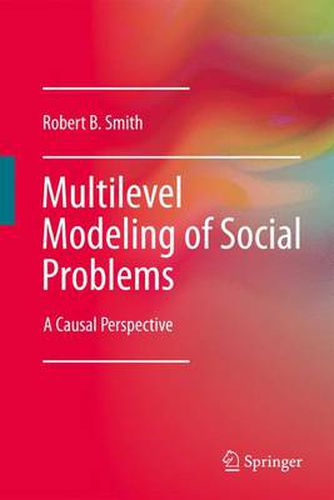Readings Newsletter
Become a Readings Member to make your shopping experience even easier.
Sign in or sign up for free!
You’re not far away from qualifying for FREE standard shipping within Australia
You’ve qualified for FREE standard shipping within Australia
The cart is loading…






This title is printed to order. This book may have been self-published. If so, we cannot guarantee the quality of the content. In the main most books will have gone through the editing process however some may not. We therefore suggest that you be aware of this before ordering this book. If in doubt check either the author or publisher’s details as we are unable to accept any returns unless they are faulty. Please contact us if you have any questions.
Uniquely focusing on intersections of social problems, multilevel statistical modeling, and causality; the substantively and methodologically integrated chapters of this book clarify basic strategies for developing and testing multilevel linear models (MLMs), and drawing casual inferences from such models. These models are also referred to as hierarchical linear models (HLMs) or mixed models.
The statistical modeling of multilevel data structures enables researchers to combine contextual and longitudinal analyses appropriately. But researchers working on social problems seldom apply these methods, even though the topics they are studying and the empirical data call for their use. By applying multilevel modeling to hierarchical data structures, this book illustrates how the use of these methods can facilitate social problems research and the formulation of social policies. It gives the reader access to working data sets, computer code, and analytic techniques, while at the same time carefully discussing issues of causality in such models.
This book innovatively: *Develops procedures for studying social, economic, and human development. * Uses typologies to group (i.e., classify or nest) the level of random macro-level factors. * Estimates models with Poisson, binomial, and Gaussian end points using SAS’s generalized linear mixed models (GLIMMIX) procedure. * Selects appropriate covariance structures for generalized linear mixed models. * Applies difference-in-differences study designs in the multilevel modeling of intervention studies. *Calculates propensity scores by applying Firth logistic regression to Goldberger-corrected data. * Uses the Kenward-Rogers correction in mixed models of repeated measures. * Explicates differences between associational and causal analysis of multilevel models. * Consolidates research findings via meta-analysis and methodological critique. *Develops criteria for assessing a study’s validity and zone of causality.
Because of its social problems focus, clarity of exposition, and use of state-of-the-art procedures; policy researchers, methodologists, and applied statisticians in the social sciences (specifically, sociology, social psychology, political science, education, and public health) will find this book of great interest. It can be used as a primary text in courses on multilevel modeling or as a primer for more advanced texts.
$9.00 standard shipping within Australia
FREE standard shipping within Australia for orders over $100.00
Express & International shipping calculated at checkout
This title is printed to order. This book may have been self-published. If so, we cannot guarantee the quality of the content. In the main most books will have gone through the editing process however some may not. We therefore suggest that you be aware of this before ordering this book. If in doubt check either the author or publisher’s details as we are unable to accept any returns unless they are faulty. Please contact us if you have any questions.
Uniquely focusing on intersections of social problems, multilevel statistical modeling, and causality; the substantively and methodologically integrated chapters of this book clarify basic strategies for developing and testing multilevel linear models (MLMs), and drawing casual inferences from such models. These models are also referred to as hierarchical linear models (HLMs) or mixed models.
The statistical modeling of multilevel data structures enables researchers to combine contextual and longitudinal analyses appropriately. But researchers working on social problems seldom apply these methods, even though the topics they are studying and the empirical data call for their use. By applying multilevel modeling to hierarchical data structures, this book illustrates how the use of these methods can facilitate social problems research and the formulation of social policies. It gives the reader access to working data sets, computer code, and analytic techniques, while at the same time carefully discussing issues of causality in such models.
This book innovatively: *Develops procedures for studying social, economic, and human development. * Uses typologies to group (i.e., classify or nest) the level of random macro-level factors. * Estimates models with Poisson, binomial, and Gaussian end points using SAS’s generalized linear mixed models (GLIMMIX) procedure. * Selects appropriate covariance structures for generalized linear mixed models. * Applies difference-in-differences study designs in the multilevel modeling of intervention studies. *Calculates propensity scores by applying Firth logistic regression to Goldberger-corrected data. * Uses the Kenward-Rogers correction in mixed models of repeated measures. * Explicates differences between associational and causal analysis of multilevel models. * Consolidates research findings via meta-analysis and methodological critique. *Develops criteria for assessing a study’s validity and zone of causality.
Because of its social problems focus, clarity of exposition, and use of state-of-the-art procedures; policy researchers, methodologists, and applied statisticians in the social sciences (specifically, sociology, social psychology, political science, education, and public health) will find this book of great interest. It can be used as a primary text in courses on multilevel modeling or as a primer for more advanced texts.